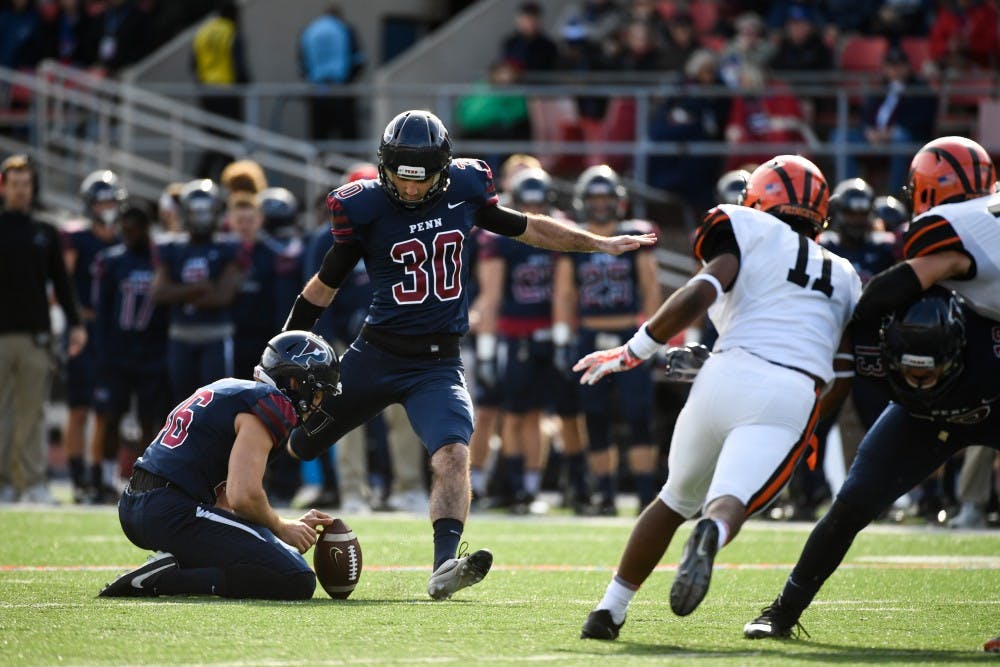
After not playing much his first two seasons, senior kicker Jack Soslow changed the way he approached football, and it has paid dividends ever since.
Credit: Chase Sutton“I have some of the best hands on the team.”
That's a claim you'd expect to hear from a wide receiver or cornerback. But, in this case, the declaration came from Penn football’s senior long snapper, Carson Vey.
Senior kicker Jack Soslow took Vey’s claim a step further.
“He has the best hands on the team.”
Exchanges like these highlight the camaraderie shared among of one of football’s least heralded group — the special teams. They are rarely interviewed after games or covered in the media, but specialists play a vital role for Penn football.
Given the difference with their positions, the football lives of specialists differ greatly from the rest of the team.
The special teams group, which consists of Soslow, Vey, freshman punter Jake Haggard, and kickers Drew Brennan, David Perkins, and Daniel Karrash, heads out onto the practice field 35-40 minutes before the rest of the team to perform warmup drills and various individual exercises. When the rest of the team arrives, it marks the beginning of “specials” period, where the specialists work on all types of snaps, punts, and field goals that could occur in games.
Once practice gets underway for the rest of the team, Soslow, Vey, and Haggard move to the sidelines, where they spend time perfecting their crafts.
Coach Ray Priore allots two or three blocks each practice for special teams. In between these blocks, the specialists work on all aspects of their technique such as footwork and dry snaps, as they cannot take the field to kick or snap with the rest of the team on the field.
“Most of the time what we want to work on is more up to us because we have a good idea of exactly what it takes to make ourselves better,” Soslow said.
For Soslow, he aims to kick the ball 50 times per practice, including 12-20 live kicks. During live kicks, he urges his teammates to try and get in his head to simulate the pressure of a game.
The best trash talkers on the team include senior defensive lineman Cooper Gardner, senior defensive back Sam Philippi, and offensive coordinator John Reagan. Soslow also praised last year’s starting quarterback, Will Fischer-Colbrie, for being someone who always got in his head.
However, on this day, it was sophomore holder David Perkins who delivered the most merciless line of the afternoon.
“Perkins had a good one,” Soslow laughed. “He said ‘Soslow, you know you’re not as good as you were last year’ right before [I was] about to kick, but I nailed it.”
A typical day for Vey includes 20-25 live short snaps, which does not include various drills he does on the side.
Still, for game day, its important for both aces to stay as fresh as possible. As Saturday approaches, the seniors wane off reps.
“Finding that right balance is probably the hardest thing to do but we’ve been doing it for four years now,” Vey said. “I think we’ve found a good balance on how to prioritize each practice to the way we want to.”
Aside from the physical repetition, the mental side of special teams is what makes the difference during games.
Before proving to be one of the best kickers in the Ivy League last season, Soslow had a different role in his sophomore season as the team's kickoff specialist. He missed his only field goal attempt that year, but after changing his approach, he saw success.
“It wasn’t until I could harness the mental aspect of kicking, [that] was the point I became good,” Soslow said. “What I did was I changed up my attitude to have instead of zero focus, 100 percent focus. So when I’m back there, it’s 100 percent focus on what I need to succeed — rather than detaching myself from the pressure of the situation, it’s learning with how to deal with it.”
He felt that constantly repeating the same motion to commit it to muscle memory made him less prepared for pressure situations, where the variables differ from routine kicks in practice. Not treating any kick in practice as "just another kick" transformed Soslow into one of the most accurate kickers in the country.
For Vey, he is mainly focused on making sure he stays out of the headlines.
“Go do your job and get it done. It’s as simple as that,” Vey said. “If they don’t call your name during the game, you probably had a great game.”
As the season approaches, chances are that most of the starters and coaches will receive more acclaim and attention than the special teams unit.
But that's just the way they want it.
Correction: A previous version of this article indicated that there are three specialists on the team. There are in fact six. The DP regrets the error.
The Daily Pennsylvanian is an independent, student-run newspaper. Please consider making a donation to support the coverage that shapes the University. Your generosity ensures a future of strong journalism at Penn.
Donate



